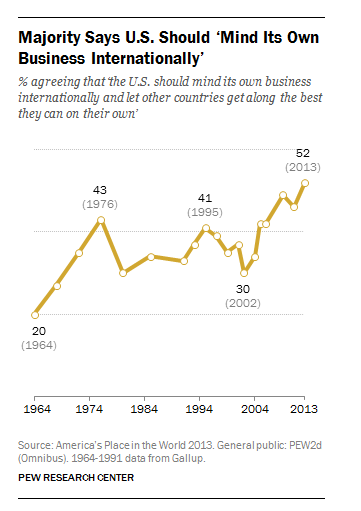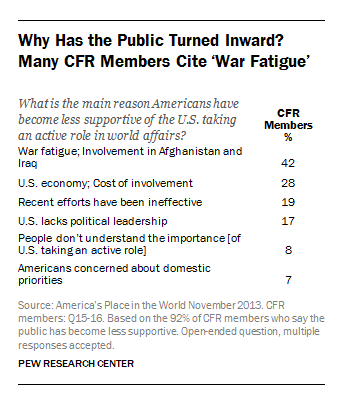Americans’ appraisal of what the U.S.’s role in the world should be has shifted dramatically since Pew first began conducting their surveys, most noticeably during the Vietnam War and after the invasion of Iraq commenced:
According to Pew’s pollsters, however, the public hasn’t been this skeptical of foreign interventionism since they first started conducting the survey nearly a half century ago:
The public’s skepticism about U.S. international engagement – evident in America’s Place in the World surveys four and eight years ago – has increased. Currently, 52% say the United States “should mind its own business internationally and let other countries get along the best they can on their own.” Just 38% disagree with the statement. This is the most lopsided balance in favor of the U.S. “minding its own business” in the nearly 50-year history of the measure.
After the recent near-miss with U.S. military action against Syria, the NATO mission in Libya and lengthy wars in Afghanistan and Iraq, about half of Americans (51%) say the United States does too much in helping solve world problems, while just 17% say it does too little and 28% think it does the right amount. When those who say the U.S. does “too much” internationally are asked to describe in their own words why they feel this way, nearly half (47%) say problems at home, including the economy, should get more attention.
Recommended
That being said, Americans are hardly in favor of isolationism:
But the public expresses no such reluctance about U.S. involvement in the global economy. Fully 77% say that growing trade and business ties between the United States and other countries are either very good (23%) or somewhat good (54%) for the U.S. Just 18% have a negative view. Support for increased trade and business connections has increased 24 points since 2008, during the economic recession.
Why are Americans increasingly unwilling to support the U.S. taking on a more “active role” in the world? War fatigue, mostly:
Finally, despite repeated assurances from various quarters that after the president was elected in 2008 the world would look at the United States, er, more favorably, that much-hoped-for outcome has largely proven to be an illusion:
An even larger majority says the U.S. is losing respect internationally. Fully 70% say the United States is less respected than in the past, which nearly matches the level reached late in former President George W. Bush’s second term (71% in May 2008). Early last year, fewer Americans (56%) thought that the U.S. had become less respected globally.
Foreign policy, once a relative strength for President Obama, has become a target of substantial criticism. By a 56% to 34% margin more disapprove than approve of his handling of foreign policy. The public also disapproves of his handling of Syria, Iran, China and Afghanistan by wide margins. On terrorism, however, more approve than disapprove of Obama’s job performance (by 51% to 44%).



























Join the conversation as a VIP Member